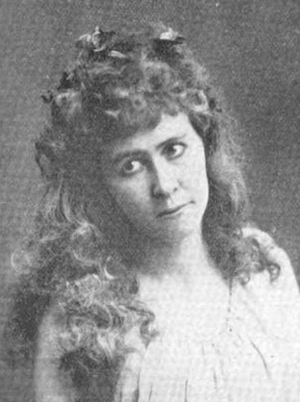Lulah Ragsdale

Tallulah “Lulah” Ragsdale (1862-1953) was an American poet, novelist and actor from the U.S. state of Mississippi. She was one of the state’s first female writers.[1]
Biography
Tallulah “Lulah” Ragsdale was born in the family mansion of "Cedar Hall" in Lawrence County, Mississippi, though that area subsequently become Lincoln County,[2] on 5 February 1866. She was the only child of the Confederate officer, James Lafayette Ragsdale, who died in battle during the American Civil War. Her mother was a member of the Hooker family. One of her ancestors was Nathaniel Hooker, a pilgrim father, whose immediate descendants settled in Virginia.[3][4]
Ragsdale received her early education from her mother. At an early age, Ragsdale became an unsatisfiable reader, always seeking the weird, the unreal, the mystic; or else, the vivid, the passionate, the glowing in prose and poetry. The characters in her favorite books became her best friends, and in the constant company of such unreal creatures as she most fancied, her thoughts, her manners and her conversation became very odd and unchildlike.[4] At 16, Ragsdale graduated from Whitworth Female College in Brookhaven, and though she had been writing in secret for some years, it was not until about 1890 that her first published poem, "My Love," appeared in the New Orleans Times-Democrat (now The Times-Picayune). It at once created a furor in the South, and was copied widely. Her "Galatea," "Upton Rey" and many other poems were stereotyped and reproduced throughout the US. Her poems appeared in the leading southern papers, but she also wrote for many northern magazines, as well as weekly and daily papers.[3][4]
Along with poetry, she also studied drama, and was a successful actresses.[3] However, her novels, written in the 1890s through the 1920s which earned her a reputation as a writer.[2] She lived at Hardy House in Brookhaven,[5] which is on the National Register of Historic Places listings in Lincoln County, Mississippi.
Selected works
- 1892, The crime of Philip Guthrie
- 1893, A shadow's shadow
- 1917, Miss Dulcie from Dixie
- 1920, Next-Besters
References
- ↑ "Lula Ragsdale Collection". Lincoln-Lawrence-Franklin Regional Library. Retrieved 25 November 2016.
- 1 2 Lloyd 1981, p. 378.
- 1 2 3 Willard & Livermore 1897, p. 594.
- 1 2 3 Moulton 1893, p. 275.
- ↑ Howell 1998, p. 38.
Bibliography
- Howell, Elmo (1 May 1998). Mississippi Back Roads: Notes on Literature and History. Elmo Howell. ISBN 978-0-9622026-6-7.
- Lloyd, James B. (1981). Lives of Mississippi Authors, 1817-1967. University Press of Mississippi. ISBN 978-1-61703-418-3.
- Moulton, Charles Wells (1893). The Magazine of Poetry. 5 (Public domain ed.). Charles Wells Moulton.
- Willard, Frances Elizabeth; Livermore, Mary Ashton Rice (1897). American Women: Fifteen Hundred Biographies with Over 1,400 Portraits: A Comprehensive Encyclopedia of the Lives and Achievements of American Women During the Nineteenth Century. Mast, Crowell & Kirkpatrick.
Attribution
-
 This article incorporates text from a work in the public domain: C. W. Moulton's The Magazine of Poetry (1893)
This article incorporates text from a work in the public domain: C. W. Moulton's The Magazine of Poetry (1893) -
 This article incorporates text from a work in the public domain: F. E. Willard & M. A. R. Livermore's American Women: Fifteen Hundred Biographies with Over 1,400 Portraits: A Comprehensive Encyclopedia of the Lives and Achievements of American Women During the Nineteenth Century (1897)
This article incorporates text from a work in the public domain: F. E. Willard & M. A. R. Livermore's American Women: Fifteen Hundred Biographies with Over 1,400 Portraits: A Comprehensive Encyclopedia of the Lives and Achievements of American Women During the Nineteenth Century (1897)